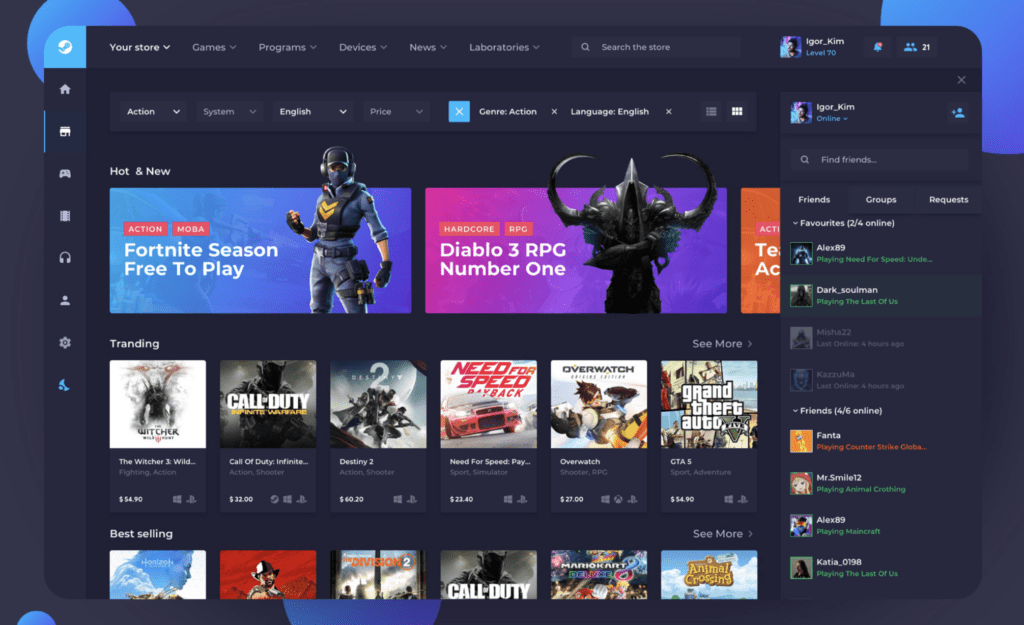Are you looking to invest in Valve Corporation’s stock? Here’s what you need to know about valve stock: Valve, the creator of Steam and games such as Half-Life, is a privately-held company and its stock isn’t available on the public market. This guide spells out the facts about Valve’s stock status and delivers insight into alternative investment approaches in the gaming industry.
Key Takeaways
Valve Corporation, a private company, is a major player in the gaming industry with innovative game designs and the successful Steam distribution platform but remains inaccessible to public investors.
Valve’s stance on remaining privately held allows it to prioritize its product and users over investor demands, steering clear of the short-term financial pressures faced by public companies.
While direct investment in Valve is not an option for retail investors, alternative investments include gaming-focused mutual funds, ETFs, and stocks of publicly traded game companies or those providing ancillary services to the gaming industry.
Valve’s Impact on the Gaming Industry
In the bustling landscape of the gaming industry, few names stand out as much as Valve Corporation. Founded in 1996 by Gabe Newell and Mike Harrington, Valve has carved out a significant niche for itself, setting new standards in game design, development, and distribution. The company’s groundbreaking approach to game design, treating them as hypotheses and play-testing as experiments, has revolutionized how video games are developed.
Valve’s success is not just rooted in game design but also in the embracement of community-created content. A prime example is the transformation of Counter-Strike from a mod to a major gaming franchise, made possible through the Steam platform. With a focus on creating immersive gameplay experiences and implementing robust anti-cheat measures, Valve has built a strong reputation in the gaming community. The company’s impact on the gaming industry is undeniable, establishing it as a powerhouse in the realm of digital entertainment.
Valve Corporation’s History

Valve Corporation’s journey began in 1996, born from the ambitious minds of former Microsoft employees Gabe Newell and Mike Harrington. Their debut game, Half-Life, was a testament to their innovative vision. The game’s unique blend of cutting-edge gameplay and narrative quickly established Valve as a key player in the gaming industry, setting the stage for the company’s future successes and marking the beginning of Valve’s history.
From its humble beginnings, Valve has grown exponentially, a testament to its strong leadership, innovative game design, and the unrelenting demand for quality gaming experiences. Today, Valve stands as a beacon of creativity and innovation in the gaming industry, continually pushing boundaries and setting new standards.
Game Development Successes

Beyond its initial success with Half-Life, Valve has developed a diverse portfolio of successful titles, further cementing its position in the gaming industry. Games such as Portal and Counter-Strike have not only enjoyed commercial success but have also defined their respective genres. These titles, coupled with Valve’s continuous innovation in gameplay, highlight Valve’s success in game development.
The company’s approach to game development and its commitment to delivering immersive gaming experiences have contributed significantly to its success. Each game released under the Valve banner is a testament to the company’s dedication to quality and innovation, embodying the essence of what makes Valve a leading figure in the gaming industry.
Steam Platform

A discussion about Valve’s impact would be incomplete without a look at the Steam platform. Dominating the market for downloaded PC games, Steam has been a driving force in the growth of digital distribution in the gaming industry.
Initially conceived as a means to manage updates and combat cheating in games like Counter-Strike, Steam has evolved into a vibrant online multiplayer ecosystem. Features that facilitate game sharing among families, live streaming within home networks, and user-generated content have reshaped the gaming landscape, keeping users engaged and contributing to Steam’s success as a digital distribution platform.
Game Sales Revenue Generated by Steam
| Year | Revenue (in US millions) |
| 2023 | $8.55M |
| 2022 | $8.78M |
| 2021 | $10.04M |
| 2020 | $9.72M |
Valve Stock: Public or Private?
For those who have been impressed by Valve’s success and are wondering how to buy Valve stock, there’s a critical point to note. Valve is a privately held company, which means it does not offer its stock on the public market. Despite its significant success in the gaming industry, Valve has chosen not to go public, thus keeping its stocks out of reach for retail investors and individuals.
Valve’s decision to remain private might seem unusual to some, considering the financial success the company has enjoyed. However, Valve has made it clear that it is content with its private status and has no current plans for an initial public offering (IPO). The reasons behind this decision are linked to the company’s unique ownership structure and business philosophy, which we will delve into in the following sections.
Valve’s Ownership Structure
A key factor in understanding Valve’s decision to remain private lies in its ownership structure. Gabe Newell, one of the company’s co-founders, has a majority stake Valve Corporation. This majority stake allows Newell to steer the company’s direction and uphold its unique corporate culture.
Valve’s ownership structure goes beyond Newell’s majority stake. The company also follows a shared ownership model, where employees receive stock or stock options as part of their compensation. This approach not only motivates employees but also contributes to a sense of shared ownership and collective decision-making within the company.
Reasons for Remaining Private
Valve’s decision to remain private, rather than becoming a publicly traded company, has allowed it to maintain control and focus on long-term objectives over short-term financial reporting. By not being obligated to disclose financial details, Valve enjoys a degree of privacy and flexibility in operations, which is not always available to publicly traded companies.
The decision also enables Valve to prioritize its actual product consumers instead of shifting attention to investor demands, which could compromise the user experience. This approach ensures that Valve continues to deliver high-quality gaming experiences without external pressures influencing the design process.
Investing in Valve: Options and Alternatives
While direct investment in Valve may not be possible due to its private status, there are alternatives for those looking to invest in the gaming industry. These alternatives include investing in gaming-focused mutual funds or ETFs, as well as investing in competitor companies that are publicly traded.
Some ETFs might include holdings in companies that do business with Valve, providing indirect exposure to Valve’s financial performance. Companies like NVIDIA and AMD, who are hardware suppliers for gaming that could be used with Valve’s products, are also potential investment opportunities.
Accredited Investors
For accredited investors, there’s a potential option to invest in Valve through platforms like Equitybee. While Valve does not currently offer pre-IPO trading on Equitybee, the platform may potentially offer Valve shares in the future, should the company’s stance change or a Valve IPO occur.
Accredited investors are advised to monitor the latest news on Valve for opportunities to invest in the company’s shares. However, it’s crucial to remember that investing in private companies entails risks and should be approached with caution.
Retail Investors
Retail investors can gain exposure to the gaming industry through the stock market by investing in publicly traded gaming stocks such as Activision Blizzard, Electronic Arts, Take-Two Interactive, and Ubisoft. Additionally, gaming funds and ETFs, like the VanEck Vectors Video Gaming and eSports ETF, Global X Video Games & Esports ETF, and Wedbush ETFMG Video Game Tech ETF provide a diversified portfolio of gaming companies for investors.
Investments can also be made in companies that indirectly benefit from the video game industry, such as those providing services to the gaming industry, including:
software
hardware
conducting tournaments
manufacturing merchandise
However, investors are advised to do their due diligence and research before investing in the gaming industry and to diversify their investment portfolio to mitigate risks.
Valve’s Future Prospects
Valve’s future prospects look promising. Despite being a private company, industry experts estimate Valve as highly profitable, with the company generating over $10 billion in revenue and over $2 billion in profit in 2022. The company has plans for future iterations of the Steam Deck and is expected to provide updates for games like Team Fortress 2 and potentially release a new operation for Counter-Strike: Global Offensive in 2023.
These future endeavors reflect Valve’s constant pursuit of innovation and its commitment to delivering high-quality gaming experiences. Whether it is enhancing the Steam Deck or pushing the boundaries of virtual reality, Valve continues to lead the way in the pc gaming industry and the gaming industry as a whole.
Steam Deck Launch
Since its launch in February 2022, the Steam Deck, a portable gaming device running on Linux, has turned heads in the gaming industry. Valve reported sales of ‘multiple millions’ of Steam Decks, but unfortunately there are no numbers publicly available to corroborate this.
Valve is not resting on its laurels after the successful launch of the Steam Deck. The company is developing new models, including two OLED versions with extended battery and improved cooling set to release in November 2023. They are also working on a second-generation Steam Deck, promising system enhancements expected in two to three years.
Virtual Reality and Valve Index
Valve’s venture into the virtual reality market began with the unveiling of SteamVR and the HTC Vive at the Game Developers Conference in March 2015. The company later released its own VR headset, the Valve Index, in June 2019, featuring a wider field of view and a higher refresh rate than competitors.
Valve continues to innovate in the VR space, hinting at the development of new VR equipment confirmed by driver updates and patents. It also rolled out the beta of SteamVR 2.0, which includes significant improvements.
In a bid to make VR more accessible, Valve is expanding VR support to platforms like Linux and MacOS with SteamVR compatibility.
Legal Challenges and Controversies
Like any successful company, Valve has faced its fair share of legal challenges and controversies. From an investigation by the European Commission for anti-competitive practices to lawsuits related to third-party gambling sites using the Steamworks API, Valve has navigated tumultuous legal waters.
Despite these challenges, Valve has consistently demonstrated resilience, addressing legal issues head-on while continuing to innovate and drive the gaming industry forward. In the following sections, we will delve into two major legal challenges Valve faced – a lawsuit against Vivendi Universal Games and an investigation for anti-competitive practices.
Valve vs. Vivendi Universal Games
In a significant legal dispute, Valve initiated a lawsuit against its then-publisher Sierra On-Line, part of Vivendi Universal Games (VUG). The company alleged copyright infringement for Sierra’s placement of Valve games in Internet cafés, claiming that Sierra’s activities exceeded their limited license agreement. The dispute saw Valve accusing Sierra of breach of contract for not paying royalties owed and for delaying the release of Condition Zero, while Vivendi hit back with claims to invalidate the agreement and sought ownership of the Half-Life IP.
The dispute concluded with the following outcomes:
Judge Thomas Samuel Zilly ruled in Valve’s favor
The judgment prevented Vivendi from distributing Valve games in cyber cafés
The judgment confirmed Valve’s right to recover copyright damages
The result marked a significant legal victory for Valve, reinforcing the company’s rights to its intellectual property and the control of its distribution.
Anti-Competitive Practices Investigation
Valve and five publishers found themselves on the wrong side of the law when the European Commission fined them a total of €7.8 million for breaching EU antitrust rules. The Commission found that the companies were engaging in geo-blocking practices that restrict cross-border sales within the European Economic Area based on user location.
While the publishers received reductions in their fines for cooperating with the Commission, Valve did not cooperate and was fined €1,624,000. The fine was imposed under the ordinary antitrust procedure, marking a stern reminder of the legal implications of anti-competitive practices in the gaming industry.
Summary
Valve Corporation’s journey from a small startup to a major player in the gaming industry is a testament to its innovative vision, strategic leadership, and commitment to delivering high-quality gaming experiences. Despite being privately held, Valve has made significant strides in game design, development, and distribution, influencing the industry with its products and platforms.
Going forward, Valve shows no signs of slowing down. With plans for further development of the Steam Deck and continuous innovation in the VR space, the future looks promising for this gaming giant. Despite legal challenges and controversies, Valve continues to navigate the gaming landscape with resilience and determination, cementing its position as a trailblazer in the industry.
Frequently Asked Questions
Is Valve a publicly traded company?
Valve is a privately held company, meaning its stock is not publicly traded and the company is not required to disclose financial information as publicly traded firms do. Therefore, you cannot invest in Valve through the public market.
Who has a majority stake ofinValve?
Gabe Newell, the co-founder and managing director of Valve Corporation, has a majority stake in the company.
How successful was the launch of the Steam Deck?
The launch of the Steam Deck was highly successful, with “multiple millions” of units sold according to Valve.




